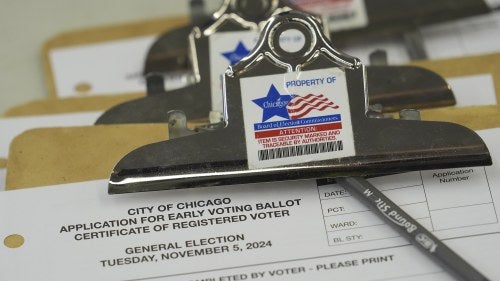Foreign Policy PACs Have Raised $2 Million From Big Chicago Donors. Where Does the Money Go?

ChicagoGlobal analyzed the biggest donations made by Chicagoland residents to PACs. Here’s what the data says about their foreign policy priorities.
As the 2024 election draws to a close, foreign policy and international conflicts in Ukraine and the Middle East are in the headlines and on voters' minds. But do they spur people to action? A new ChicagoGlobal analysis of select political giving suggests that they may not — at least in Chicagoland.
To understand how foreign policy might be driving large-dollar donations in the Chicago area, ChicagoGlobal analyzed political giving data from the campaign finance watchdog OpenSecrets. We reviewed more than 8,000 individual donations over $2,000 given to political action committees (PACs) in the first eight months of the year from residents in Cook, Lake, and DuPage counties.
We found that donations to foreign-policy-focused PACs account for only 1.3% of the $162 million given by individuals who contributed more than $2,000. Similarly, while these donors gave to nearly 900 different action groups and campaign committees, only 14 of the PACs were focused specifically on foreign or defense policy.
Contributions to these PACs may be a small slice of the political-giving pie, but they can still help shape policy, according to Steve Gates, who chairs the Automotive Free International Trade PAC (AFIT). For his PAC, every dollar counts in the effort to meet members of Congress and lobby them against tariffs and trade barriers that could affect his constituents’ highly globalized industry.
Which PACs Raised Money From Big-dollar Donors in the Chicago Area?
In the period of time that we analyzed, Chicago’s big-dollar donors gave to 14 PACs with a strong foreign policy focus. Among those, AFIT is something of an outlier — it focuses on free trade, while most of the PACs revolve around Israel, foreign conflicts, and defense spending.
Our analysis found that 93 percent of Chicago’s large donations to foreign PACs went to groups focused in some way on the conflict in Israel. These groups ranged from the influential American Israel Public Affairs Committee (AIPAC) and the pro-Israel United Democracy Project — which received by far the largest chunk of Chicago donations, at $1.5 million — to small anti-war groups like End the Occupation and Jewish Voice for Peace. The next most common theme among the PACs was general defense: A small number of Chicago’s large donations went to PACs affiliated with defense contractors like Lockheed Martin — mostly from employees and their spouses.
The comparatively small dollar value of these donations, and their limited topical scope, may make it seem that Chicagoans don’t care much about foreign policy. The likelier explanation, though, is that it just isn’t the decisive factor in their votes or political giving. Chicago Council on Global Affairs polling from earlier this year bears that out. Around half of the respondents to a survey conducted in late June and early July said that the conflicts in Ukraine and the Middle East mattered in their decision of who to vote for, but only 1 in 5 said the conflicts mattered “a great deal.”
Our analysis also focuses by design on a narrow slice of the region’s population and its donations. We found that only 8,000 people gave large-dollar donations to any PACs at all this year, despite the three-county area we studied having a total population of almost 7 million. That’s an illustrative look into how Chicagoland’s wealthiest donors think and act, but it’s not a comprehensive survey of Chicagoland residents — nor does it account for donors who are motivated by foreign policy in their giving, but choose donations direct to candidates or parties as the way to express their concerns.
Still, issue-specific and industry-specific PACs spend and raise a significant amount of money each election cycle, and their relationships to both lawmakers and donors can be deep.
AFIT has raised $2.2 million in 2024, including $37,500 from Chicago area donors who gave more than $2,000. Much of that funding comes from people with stakes in the automotive industry — owners of imported car dealerships, for instance — whom the PAC courts directly, sometimes via phone banks conducted right here in Chicago.
“We’re just calling dealers that we know,” explained Gates, “and [trying] to get dealers and general managers and sales managers and sons and daughters of dealers to make contributions to us.”
Once the funds are raised, AFIT channels them directly to candidates that they believe will have a positive impact on the auto industry by voting against tariffs and similar policies that could hamper imports and sales. This year, the group has spent just under $700,000 supporting Republican House and Senate campaigns and $50,000 supporting Democrats.
“We’re not coming with big Super PAC money,” Gates said, “but when a member [of Congress] actually listens — and they often do — that personal relationship can and does make a difference.”
What Do Foreign Policy PACs Do With the Money They Raise?
PACs use many different tools to try and move the needle on their issues, including fundraising, endorsements, scorecards, and lobbying.
Foreign Policy for America (FP4A) is one of the country’s most significant PACs focused on global affairs writ large, and, though they did not receive any of the large-dollar Chicago donations from our analysis, they spoke with ChicagoGlobal about how PACs like theirs work to achieve their aims.
Andrew Albertson founded FP4A in 2017 to advocate for liberal internationalism, global democracy, and international institutions, all of which he felt were increasingly under threat. (Note: Albertson is a distant relative of this author.) The group has raised $2 million this election cycle and primarily endorses and supports Democrats.
“We’re not lacking in good ideas or good policy recommendations or good reports coming from think tanks, but we needed to do more to put some power behind those ideas,” he said.
That’s, in part, why he modeled the organization after left-leaning issue advocacy groups like the Human Rights Campaign and Everytown for Gun Safety that are known for rallying supporters and legislators alike around concrete policy actions. The group now has member communities in major cities across the country, including Chicago.
In a complicated electoral map with hundreds of races nationwide, the goal is to give donors aligned with the group’s views “a very precise understanding of where they can have the greatest impact for their next dollar of political giving,” explained Albertson.
To help do that, FP4A creates legislative scorecards to track lawmakers’ alignment with their values on issues like the Atlantic alliances, human rights, and use of military force. These include a lifetime score that tracks a lawmaker’s legislative career and a Congress score that tracks votes in the current session. This tool can both inform voters on their representatives’ views and nudge lawmakers to vote in line with a PAC’s interests.
PACs also lobby lawmakers directly, and while persuasion is often the goal, they are sometimes called to serve as an expert resource — especially on technical or thorny foreign policy issues.
Gates, for instance, said that, when he met with members of Congress to discuss legislation on electric vehicles, he learned that lawmakers “didn’t really understand anything about [them]” and were overestimating orders at local dealerships.
Albertson has seen a similar trend. “There’s a lot of stuff we work on that is kind of wonky,” he said. “I think a lot of times our issues seem a little intimidating or unapproachable.”
FP4A, then, “can oftentimes connect the dots and provide some extra reachback expertise” — particularly for people new to the Hill.
“We’re talking about congressional staff — like a 25-year-old — and they have five portfolios and one of them is ‘the world.’ So if we can be helpful, we want to do that.”
Connecting Foreign Policy to Outcomes
FP4A and AFIT both say that they try to connect their issues and advocacy to concrete outcomes. That’s meaningful when lobbying lawmakers, but it also helps when soliciting donors. Concrete changes can reassure existing donors that their funds meant more than the feel-good factor of supporting a cause, and they can also provide tangible evidence to would-be donors that their money makes a difference — which, in a perfect world, could help these foreign policy PACs grow their now-small share of overall political giving.
“It really always boils down to jobs,” said Gates. “If we had 10% tariffs on all the international nameplate vehicles that I sell, my sales would decline. I can’t hire as many people if I’m not selling cars.”
Albertson concurs. He notes that, while foreign policy’s complexity can be intimidating, it’s not as abstract to voters as some people think. In his view, voters understand how foreign policy decisions impact their lives, whether through rising prices or military deployments.
“I don’t like saying the voters don’t get it,” he added. “I think the problem sometimes is that we in D.C. use a language that’s too focused on process — distant. It's almost designed to be opaque and not invite democratic participation in foreign-policymaking decisions, when what we should be talking about is outcomes in people’s lives.”
This story first appeared in the ChicagoGlobal newsletter, a joint project of Crain's Chicago Business and the Chicago Council on Global Affairs.

